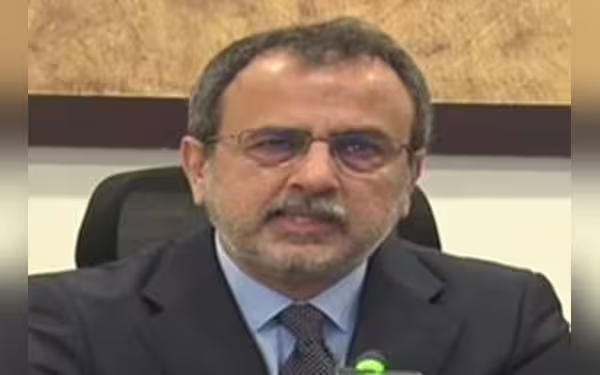Saturday, November 16, 2024 06:26 PM
Revamping Pakistan's Energy Sector: Awais Leghari's Vision
- Energy sector overhaul to meet growing demands.
- Focus on renewable energy integration by 2034.
- Privatization of DISCOs to enhance efficiency.
 Image Credits: nation_pk
Image Credits: nation_pkAwais Leghari announces a comprehensive strategy to revamp Pakistan's energy sector, focusing on modernization, renewable energy, and privatization.
In recent years, Pakistan's energy sector has faced numerous challenges, including power shortages, inefficiencies, and rising costs. The government has recognized the urgent need to revamp the transmission and distribution systems to meet the growing energy demands of the country. Minister for Power Division, Sardar Awais Ahmed Khan Leghari, has announced a comprehensive strategy aimed at modernizing these systems, ensuring that they are equipped to handle future requirements.
During a recent address at the National University of Science and Technology (NUST), Minister Leghari emphasized the importance of energy in driving the economy. He stated, "As energy always plays a key role in the economy of the country, the generation, transmission, and distribution system of the energy sector is being revamped on modern lines." This initiative is not just about increasing capacity; it also focuses on integrating environmentally friendly renewable energy sources into the national grid. The minister revealed that approximately 17,000 megawatts (MW) of renewable energy are expected to be added to the system by 2034.
One of the critical issues in the past has been the manner in which energy generation was approached. Leghari pointed out that the generation aspect had not been developed using a "least cost methodology," which is essential for sustainable growth. He assured that future generation projects would adhere to this cost-effective approach. Furthermore, he acknowledged the ongoing discussions with Independent Power Producers (IPPs) to resolve existing issues amicably, expressing gratitude for their cooperation in revising contract conditions.
Leghari also highlighted the need for a competitive environment in the power sector. He argued that power generation should primarily be driven by the private sector, rather than relying on a single purchaser like the Central Power Purchasing Agency (CPPA). He stated, "There must be competition, which would not only help bring down the prices of electricity but also create a competitive environment in the country." This shift towards privatization and competition is expected to enhance efficiency and reduce costs for consumers.
Addressing the challenges faced by power distribution companies (DISCOs), the minister revealed that a staggering sum of Rs 595 billion is budgeted annually to cover losses and power theft. He described this situation as "unbelievable, unacceptable, and also not sustainable," indicating a pressing need for reform. To tackle these issues, the government plans to appoint qualified professionals to the boards of these companies, ensuring they operate efficiently.
Looking ahead, Leghari announced that three DISCOs would be privatized within the next three years, while two others, which have incurred losses of Rs 150 billion, would undergo concessional model reforms. This strategic move aims to enhance operational efficiency and reduce financial burdens on the government.
On the transmission side, the minister noted that the National Transmission and Despatch Company (NTDC) had previously struggled with leadership but is now under the guidance of a senior advisor from LUMS. He mentioned plans to bifurcate the NTDC into three separate entities, which is expected to streamline operations and improve service delivery.
The revamping of Pakistan's energy sector is a crucial step towards ensuring a sustainable and efficient power supply for the future. By focusing on modernization, competition, and professional management, the government aims to create a robust energy framework that not only meets the current demands but also paves the way for economic growth and stability. As these changes unfold, it will be essential for stakeholders to remain engaged and informed, ensuring that the benefits of these reforms are realized across the nation.













